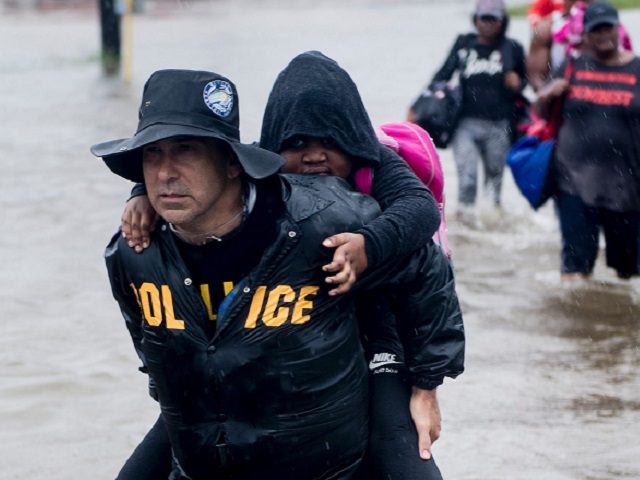In a new study, researchers hope to glean a better understanding of the possible health risks Hurricane Harvey victims face by outfitting them with special wristbands that monitor exposure to contaminated flood waters and airborne toxins.
This wristband project, funded by Baylor College of Medicine, includes scientists from the University of Texas Health Science Center at Houston (UTHealth) School of Public Health, Texas A&M University, Oregon State University, Baylor Environmental Health Service, the Dan L. Duncan Comprehensive Cancer Center, and the Alkek Center for Metagenomics and Microbiome Research.
Oregon State University provided the wristbands to those individuals who returned home to tackle recovery and cleanup efforts following last month’s superstorm. The hurricane ripped through the Texas Gulf Coast, oversaturating Houston and the surrounding areas with record rainfall and, reportedly, unprecedented flooding.
Over the weekend, the researchers began handing out these wristbands to people in Addicks, East Houston, and Baytown. The rubber band-looking bracelets can determine exposure to contaminated water and airborne toxins. According to a Baylor College of Medicine news release, the wristbands detect volatile and semi-volatile chemicals directly from the air and water. Residents wear them for seven days. Then, scientists collect them for testing.
Dr. Cheryl Walker, director of the Center for Precision Environmental Health at Baylor College of Medicine, called the study “real time” monitoring for possible post-Harvey chemical exposures.
However, the wristbands cannot measure everything. Researchers plan to administer questionnaires to gather other information on contaminants like mold. Through combined data, the team hopes to better assess any possible dangers of chemicals to Harvey’s victims or on the environment.
“It is so important to establish a cohort of those affected by Harvey to understand short-term and long-term health effects as a result of flood waters,” said Dr. Melissa Bondy, professor of medicine-epidemiology and population sciences and associate director for Cancer Prevention and Population Sciences of the Dan L Duncan Comprehensive Cancer Center.
Oregon State University Professor Kim Anderson told KHOU: “The assessment of an individual’s exposure to chemicals in the environment is critical to understanding if and how these exposures may affect human health.” She said: “Despite the importance of chemical exposure assessment, there is little information about the frequency and magnitude of personal exposures to many chemicals, especially during disasters.”
Previously, public health administrators issued a daunting list of potential health threats. Breitbart Texas reported they warned of purported water and airborne hazards residents might face during and after the storm including bacterial infections, chemicals, raw sewage, flesh-eating bacteria, viruses, respiratory ailments, and mold.
Data from public health officials showed that E. coli, a bacteria which can contaminate water and/or food through sewer backups, flooded water treatment plants, failed septic systems, and storm water runoff that contains animal and pet waste, raged at outrageously high levels in wastewater samples taken between September 4 and 11, as Breitbart Texas reported. Although E. coli lives in the digestive tracts of humans and animals, a person can get sick when coming into contact with water or food tainted by the fecal matter of humans or animals.
Additionally, standing water in Harvey-drenched regions became perfect breeding grounds for Aedes aegypti mosquitoes, native to Texas and which carry West Nile Virus (WNV), Zika, Dengue fever, and Chikungunya. To date, the state aerially sprayed nearly 6.4 million acres to thwart a mosquito population explosion.
Baylor officials did not indicate when the wristband study results will become available to the public.
Follow Merrill Hope, a member of the original Breitbart Texas team, on Twitter.

COMMENTS
Please let us know if you're having issues with commenting.